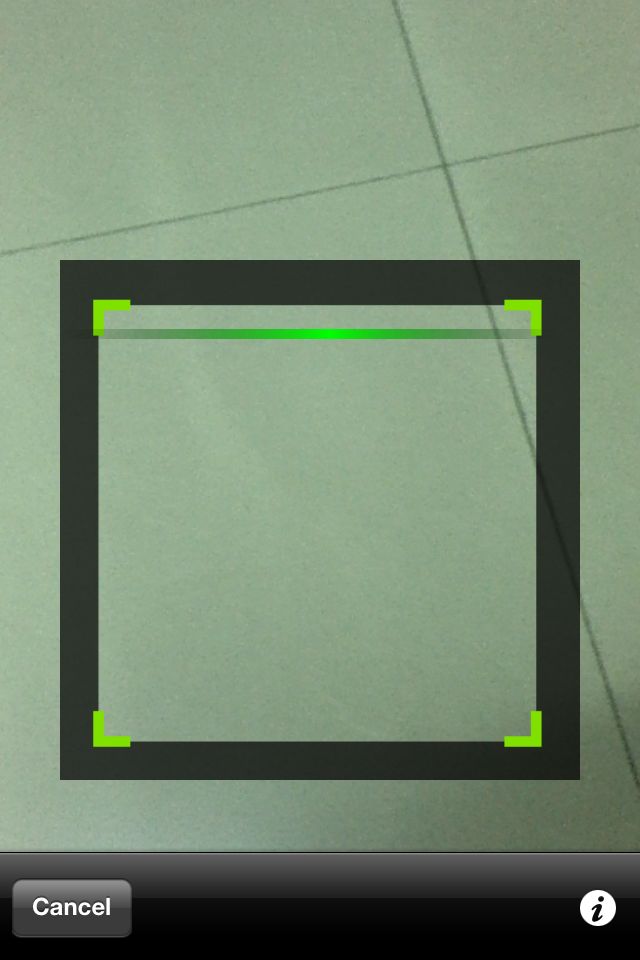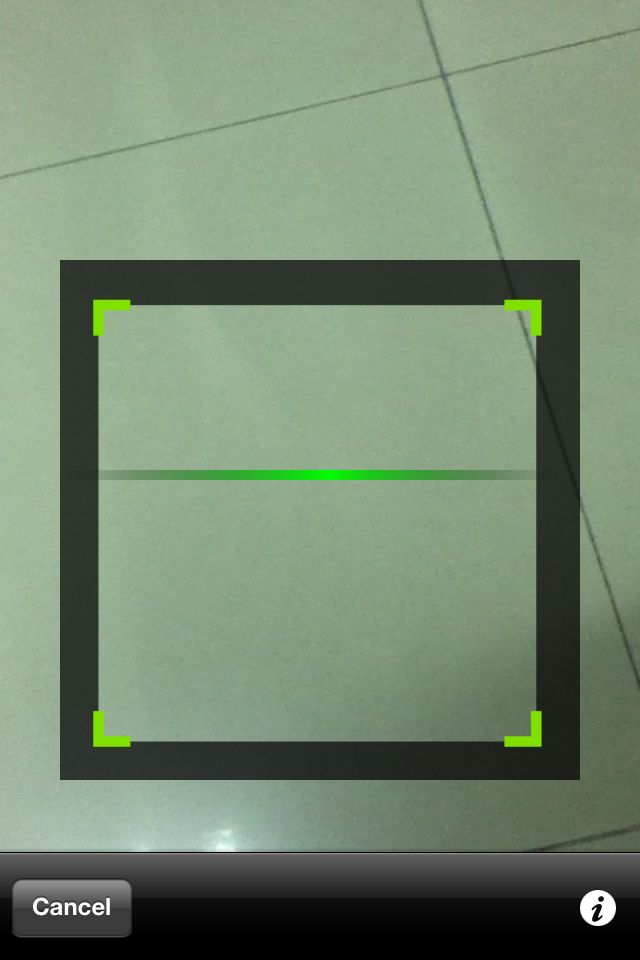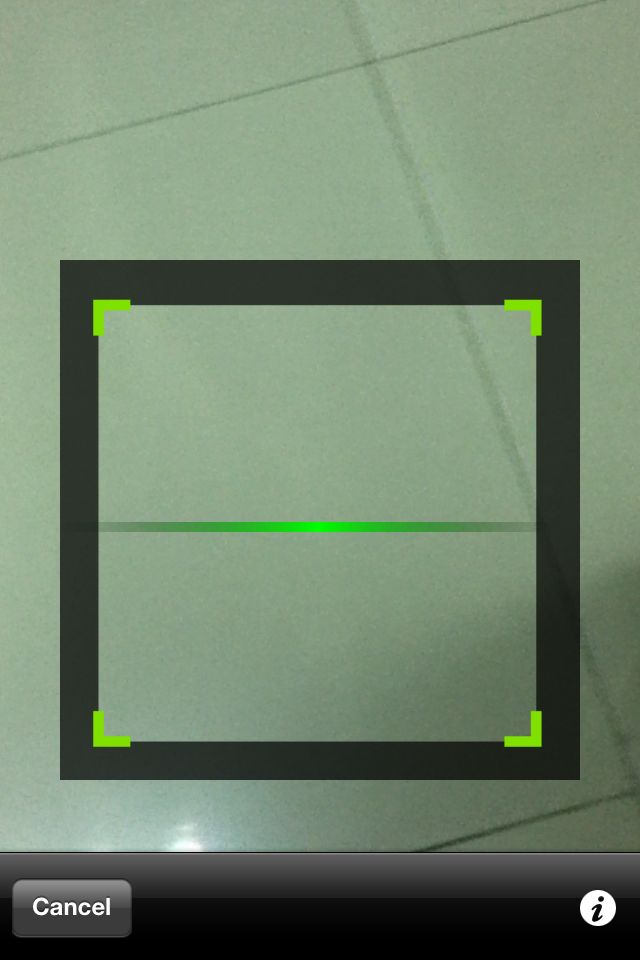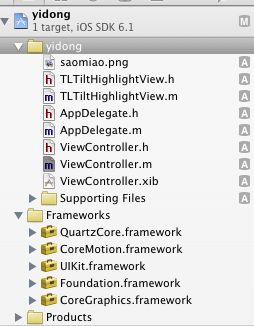IOS开发小功能2:二维码扫描界面的设计(横线上下移动)



效果图如上,实现的是一个二维码扫描界面。
下面我贴出线条上下移动的代码,至于二维码的代码是用的第三方库。
首先是整体的结构:

注意下面的库文件一个都不能少,否则会报错。
TLTiltHighlightView是划线的类。
#import <QuartzCore/QuartzCore.h> #import <CoreMotion/CoreMotion.h> #import "TLTiltHighlightView.h" // Private properties. @interface TLTiltHighlightView () // Our gradient layer. @property (nonatomic, strong) CAGradientLayer *gradientLayer; // Our motion manager. @property (nonatomic, strong) CMMotionManager *motionManager; @end @implementation TLTiltHighlightView #pragma mark - Public Initializers // Allows support for using instances loaded from nibs or storyboards. -(id)initWithCoder:(NSCoder *)aCoder { if (!(self = [super initWithCoder:aCoder])) return nil; [self setup]; return self; } // Allows support for using instances instantiated programatically. - (id)initWithFrame:(CGRect)frame { if (!(self = [super initWithFrame:frame])) return nil; [self setup]; return self; } // We need to stop our motionManager from continuing to update once our instance is deallocated. -(void)dealloc { [self.motionManager stopAccelerometerUpdates]; } #pragma mark - Private methods // Sets up the initial state of the view. -(void)setup { // Set up the gradient [self setupGradient]; // Set up our motion updates [self setupMotionDetection]; } // Creates the gradient and sets up some default properties -(void)setupGradient { NSAssert(self.gradientLayer == nil, @"Gradient layer being set up more than once."); self.backgroundColor = [UIColor colorWithWhite:1.0f alpha:0.18f]; self.highlightColor = [UIColor colorWithWhite:1.0f alpha:0.36f]; // Create a new, clear gradient layer and add it to our layer hierarchy. self.gradientLayer = [CAGradientLayer layer]; [self.layer addSublayer:self.gradientLayer]; self.gradientLayer.backgroundColor = [[UIColor clearColor] CGColor]; // Make the layer gradient horizontal self.gradientLayer.startPoint = CGPointMake(0, 0.5); self.gradientLayer.endPoint = CGPointMake(1, 0.5); // Set up the colours and position [self updateGradientColours]; [self updateGradientLayerPosition]; } // Starts the -(void)setupMotionDetection { NSAssert(self.motionManager == nil, @"Motion manager being set up more than once."); // Set up a motion manager and start motion updates, calling deviceMotionDidUpdate: when updated. self.motionManager = [[CMMotionManager alloc] init]; __weak __typeof(self) weakSelf = self; [self.motionManager startDeviceMotionUpdatesToQueue:[NSOperationQueue mainQueue] withHandler:^(CMDeviceMotion *motion, NSError *error) { if (error) { [weakSelf.motionManager stopDeviceMotionUpdates]; return; } [weakSelf deviceMotionDidUpdate:motion]; }]; } // Updates the gradient layer to fill our bounds. -(void)updateGradientLayerPosition { if ([[UIScreen mainScreen] scale] > 1) { // Running on a retina device // self.gradientLayer.frame = CGRectMake(0, CGRectGetHeight(self.bounds) - 1.5f, CGRectGetWidth(self.bounds), 1.5f); self.gradientLayer.frame = CGRectMake(0, CGRectGetHeight(self.bounds) - 1.5f, CGRectGetWidth(self.bounds), 5); } else { // Running on a non-Retina device // self.gradientLayer.frame = CGRectMake(0, CGRectGetHeight(self.bounds) - 1, CGRectGetWidth(self.bounds), 1); self.gradientLayer.frame = CGRectMake(0, CGRectGetHeight(self.bounds) - 1.5f, CGRectGetWidth(self.bounds), 5); } } // Updates the gradient's colours. -(void)updateGradientColours { self.gradientLayer.colors = @[(id)[[UIColor clearColor] CGColor], (id)[self.highlightColor CGColor], (id)[[UIColor clearColor] CGColor]]; } #pragma mark CoreMotion Methods -(void)deviceMotionDidUpdate:(CMDeviceMotion *)deviceMotion { // Called when the deviceMotion property of our CMMotionManger updates. // Recalculates the gradient locations. // Ration from the center which the centre of the gradient is permitted to move. // (ie: the centre of the gradient may be 1/4 the distance of the view from the centre.) const CGFloat maxDistanceRatioFromCenter = 4.0f; // We need to account for the interface's orientation when calculating the relative roll. CGFloat roll = 0.0f; switch ([[UIApplication sharedApplication] statusBarOrientation]) { case UIInterfaceOrientationPortrait: roll = deviceMotion.attitude.roll; break; case UIInterfaceOrientationPortraitUpsideDown: roll = -deviceMotion.attitude.roll; break; case UIInterfaceOrientationLandscapeLeft: roll = -deviceMotion.attitude.pitch; break; case UIInterfaceOrientationLandscapeRight: roll = deviceMotion.attitude.pitch; break; } // This will give us an interpolated value [-0.4 ... 0.4]. CGFloat interpolatedValue = sinf(roll) / maxDistanceRatioFromCenter; // We need to convert our ration to a decimal (0.4, in this case). CGFloat maxDistanceDecimalFromCenter = maxDistanceRatioFromCenter / 10.0f; // Find the middle position for our gradient. This needs to be in the range of [0 ... 1]. CGFloat gradientMiddlePosition = (interpolatedValue + maxDistanceDecimalFromCenter) / (maxDistanceDecimalFromCenter * 2.0f); // Finally, update our gradient layer. self.gradientLayer.locations = @[@(0), @(gradientMiddlePosition), @(1)]; } #pragma mark Overridden Methods -(void)setFrame:(CGRect)frame { [super setFrame:frame]; [self updateGradientLayerPosition]; } -(void)setBounds:(CGRect)bounds { [super setBounds:bounds]; [self updateGradientLayerPosition]; } #pragma mark - Overridden Properties -(void)setHighlightColor:(UIColor *)highlightColor { _highlightColor = highlightColor; [self updateGradientColours]; } @end
#import "ViewController.h" #import "TLTiltHighlightView.h" @interface ViewController () @end @implementation ViewController - (void)viewDidLoad { [super viewDidLoad]; // Do any additional setup after loading the view, typically from a nib. UIImageView *hbImageview=[[[UIImageView alloc] initWithImage:[UIImage imageNamed:@"saomiao.png"]] autorelease]; CGRect hbImagerect=CGRectMake(30, 130, 260, 260); [hbImageview setFrame:hbImagerect]; [self.view addSubview:hbImageview]; } - (void)didReceiveMemoryWarning { [super didReceiveMemoryWarning]; // Dispose of any resources that can be recreated. } - (IBAction)saomiao:(id)sender { //上下扫描线 TLTiltHighlightView *highlightView = [[TLTiltHighlightView alloc] initWithFrame:CGRectMake(90, 195, 130, 2)]; highlightView.highlightColor = [UIColor greenColor]; highlightView.backgroundColor = [UIColor clearColor]; highlightView.autoresizingMask = UIViewAutoresizingFlexibleWidth | UIViewAutoresizingFlexibleBottomMargin; [self.view addSubview:highlightView]; while (1) { [ViewController moveDown:highlightView andAnimationDuration:2.0 andWait:YES andLength:90.0]; [ViewController moveUp:highlightView andAnimationDuration:2.0 andWait:YES andLength:90.0]; } } + (void) moveUp: (UIView *)view andAnimationDuration: (float) duration andWait:(BOOL) wait andLength:(float) length { __block BOOL done = wait; //wait = YES wait to finish animation [UIView animateWithDuration:duration animations:^{ view.center = CGPointMake(view.center.x, view.center.y-length); } completion:^(BOOL finished) { done = NO; }]; // wait for animation to finish while (done == YES) [[NSRunLoop currentRunLoop] runUntilDate:[NSDate dateWithTimeIntervalSinceNow:0.01]]; } + (void) moveDown: (UIView *)view andAnimationDuration: (float) duration andWait:(BOOL) wait andLength:(float) length{ __block BOOL done = wait; //wait = YES wait to finish animation [UIView animateWithDuration:duration animations:^{ view.center = CGPointMake(view.center.x, view.center.y + length); } completion:^(BOOL finished) { done = NO; }]; // wait for animation to finish while (done == YES) [[NSRunLoop currentRunLoop] runUntilDate:[NSDate dateWithTimeIntervalSinceNow:0.01]]; } @end
然后是ViewController
主要实现的是两个类方法,实现上下移动。
+ (void) moveUp: (UIView *)view andAnimationDuration: (float) duration andWait:(BOOL) wait andLength:(float) length { __block BOOL done = wait; //wait = YES wait to finish animation [UIView animateWithDuration:duration animations:^{ view.center = CGPointMake(view.center.x, view.center.y-length); } completion:^(BOOL finished) { done = NO; }]; // wait for animation to finish while (done == YES) [[NSRunLoop currentRunLoop] runUntilDate:[NSDate dateWithTimeIntervalSinceNow:0.01]]; } + (void) moveDown: (UIView *)view andAnimationDuration: (float) duration andWait:(BOOL) wait andLength:(float) length{ __block BOOL done = wait; //wait = YES wait to finish animation [UIView animateWithDuration:duration animations:^{ view.center = CGPointMake(view.center.x, view.center.y + length); } completion:^(BOOL finished) { done = NO; }]; // wait for animation to finish while (done == YES) [[NSRunLoop currentRunLoop] runUntilDate:[NSDate dateWithTimeIntervalSinceNow:0.01]]; }